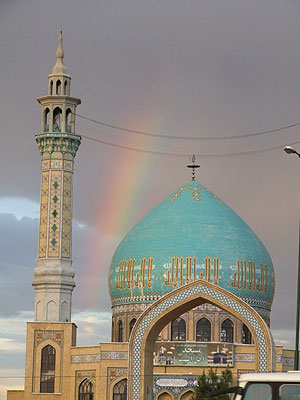 by PRESTON MACDOUGALL June 19, 2009
They are hoping and praying for a miracle, but it may be enough to give unwavering support to the Persian Priestleys.
Joseph Priestley was the 18th-century British thinker whose exceptionally creative and flexible mind led him to discover oxygen in 1774 and to advocate for republican revolutions in America and France shortly thereafter. In England, he was equally despised by king and countrymen for his famous and influential support of Dissenters from the sanctioned beliefs of the Church of England. Among those influenced by his liberal philosophy and Unitarian theology was Thomas Jefferson, who also echoed Priestley when he said "Science is my passion; politics, my duty." Priestley's renown in America was a saving grace when his welcome finally ran out in Birmingham, and a rioting mob of conservative zealots burned down his house, and destroyed his revolution-igniting chemical laboratory. The Priestley's resettled in Pennsylvania, where he declined an offer to become a Professor of Chemistry at the University of Pennsylvania in order to start a small, teaching utopia called the Northumberland Academy. In those days, there weren't as many utopians in rural Pennsylvania as there are on the streets of Tehran today, and Priestley's dream academy never had the impact that his chemical experiments did. Still, his chemical fame lit New World interest in the central science, and this continued to grow organically after his death. To celebrate the centennial of the American Revolution, the American Chemical Society was established in 1876, and in 1922 the society started awarding the Priestley Medal as its highest accolade. It is interesting to note how time can change things that seem so fundamental. At the time of our bicentennial, the Cuyahoga River had recently caught fire, and, rightly or wrongly, chemistry was in the doghouse. The ACS logo contains a phoenix rising up from the ashes, and this is meant to symbolize the chemical art of transformation of matter. With the growing recognition that chemical solutions are required to solve environmental problems, in addition to economic ones, the phoenix icon could just as easily symbolize the resurrection of chemistry's public relations fortunes. The color of chemistry's future is green, and it is interesting that one of the chemical technologies that is being developed to control the emission of greenhouse gases is carbon sequestration. In a typical process, hot CO2 emissions react with calcium oxide - which has the chemical formula CaO and is the chief component of the mineral lime - to form rock stable limestone. Limestone has the chemical formula you would expect, CaCO3. But you can think of it as carbonated lime just as carbonated water results from the reaction of CO2 and water, or H2O. The resulting compound, carbonic acid, has the chemical formula you would expect, H2CO3. But it has a chemical property that surprised Joseph Priestley when he discovered it in 1767 - it tickles your nose when you drink solutions of it. That's because unlike limestone, carbonic acid is only stable under high pressure, such as in a can of Coca Cola before you open it. When you open the can, the pressure drops and the carbon sequestration reaction is undone, releasing thousands of tiny carbon dioxide bubbles up your nose. I don't mean to make light of the politically unstable situation in Iran, but it seems to me that Priestley was right; forced marriages between government and any narrowly defined religion are inherently unstable. The conservative religious authorities sensed a defeat at the ballot box, and pressured election officials to rig the results. They did a "heckuva job" in Brownie fashion, and now peaceful protests are bubbling-up all across the country. Like freedom-seeking CO2 molecules,
there's no going back in the can. However there's nothing ticklish
about their unified message to would-be dictators: Up yours!
On the Web:
E-mail your letters & opinions to editor@sitnews.us SitNews ©2008 Stories In The News Ketchikan, Alaska |
||
